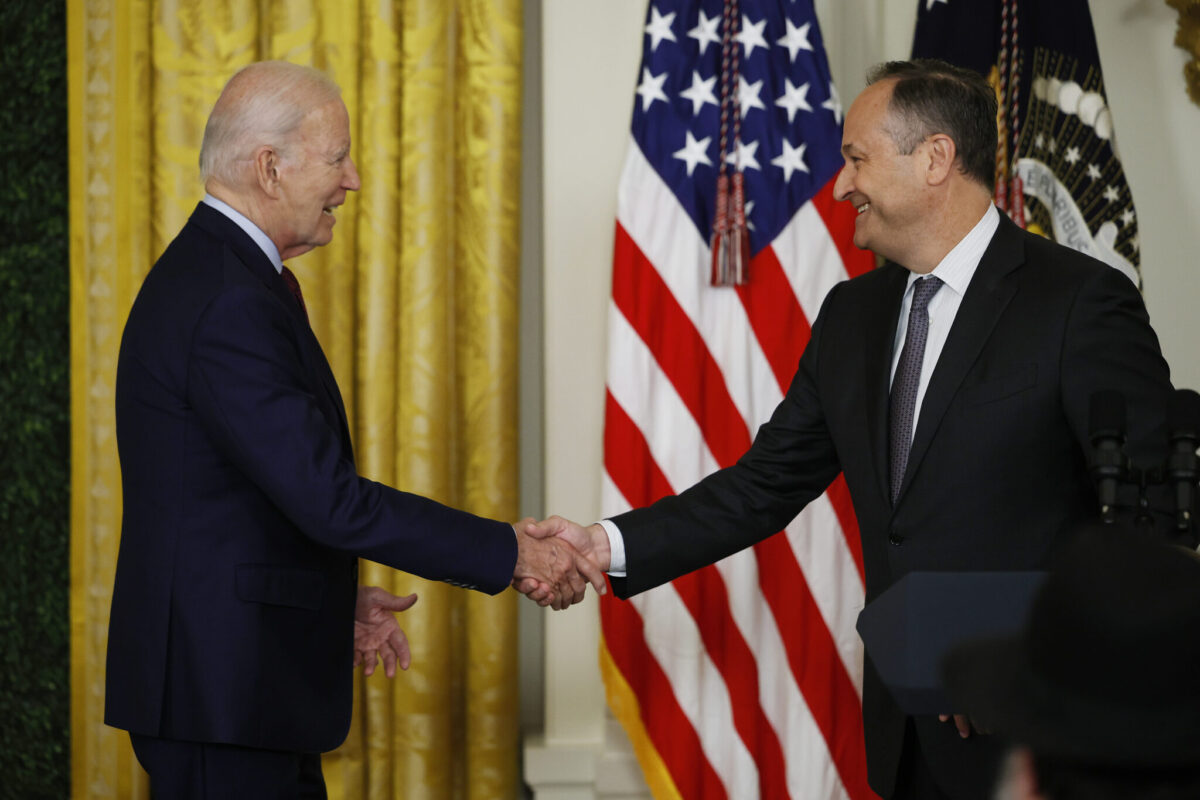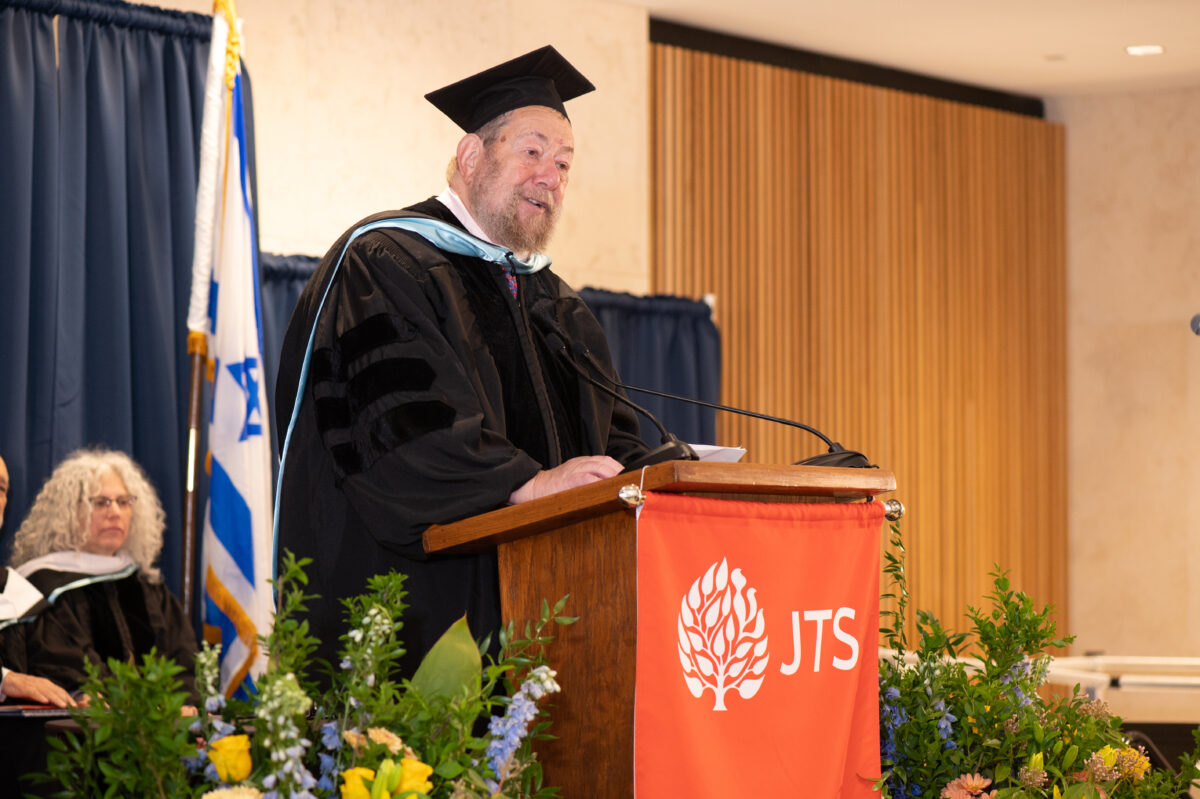Your Daily Phil: World Zionist Congress votes + Biden’s antisemitism strategy
Good Wednesday morning!
In today’s edition of Your Daily Phil, we report on President Joe Biden’s involvement in the development of the White House’s national antisemitism strategy, and feature op-eds from Rabbi Sid Schwarz and Shlomo Schreibman. We’ll start with the results of the latest World Zionist Congress.
The World Zionist Congress passed 16 resolutions on Tuesday night, four of which served as direct or subtle rebukes of Israel’s government, including one opposing the coalition’s proposed judicial overhaul. In addition to passing these resolutions, the centrist and liberal factions in the Congress also blocked the passage of two resolutions proposed by right-wing parties, reports eJewishPhilantropy’s Judah Ari Gross.
These resolutions, which passed at the same time as the Israeli government passed its budget for the next two years, are not binding but do carry symbolic weight, signifying the viewpoints of world Jewry. The World Zionist Congress, which includes representatives from a wide variety of Jewish organizations from around the globe, is often referred to as the “parliament of the Jewish people.”
Centrist and liberal factions hailed the results as a major victory for their bloc, which is technically in the minority in the Congress, with the Reform movement’s Arzenu faction deeming their efforts “overwhelmingly successful.” The World Zionist Organization’s vice-chairman and a senior member of the Conservative/Masorti movement’s Mercaz Olami faction, Yizhar Hess, said the resolutions sent “a clear message to Israel’s government: Israel must remain a Jewish AND democratic state that’s a welcoming home for each and every Jew.”
The voting opened on Sunday and ended Tuesday night in an online format, roughly a month after the World Zionist Congress held a gathering in Jerusalem. This is because the religious Zionist World Mizrachi faction, with support from other right-wing and religious parties, filibustered the in-person vote to protest what it described at the time as left-wing intransigence.
Several of the resolutions that passed this week had near unanimity, receiving more than 600 votes out of a possibly 645: one promoting aliyah, another resolving that the World Zionist Organization “salutes the State of Israel on its 75th anniversary,” and two aimed at combating antisemitism. Others dealing with “proportional representation of women” and “Anchoring the position of the Declaration of Independence in the Zionist movement” passed with more than 400 votes.
Presidential input


President Joe Biden has been engaged behind the scenes in crafting the White House’s national strategy on combating antisemitism, Second Gentleman Doug Emhoff, who has been one of the leading players in crafting the plan, said Tuesday evening, reports Marc Rod for eJewishPhilanthropy’s sister publication Jewish Insider.
Forthcoming strategy: “[Biden] has been doing a lot of work with us behind the scenes on the plan,” Emhoff said at a Jewish Democratic Council of America leadership gala in Washington, D.C. “And of course the vice president, she has been so powerful in continuing to push me on this journey of the fight against hate and antisemitism.” The strategy is expected to be released this week.
Bipartisan effort: Emhoff also praised the work of the bipartisan congressional task forces combating antisemitism, which he noted “have been doing this long before we stood up the interagency group” in the executive branch and said he was “pleasantly surprised to learn” that many members of the congressional groups are not Jewish. He said he has been “talking all the time” with lawmakers about the strategy.
E Pluribus Unum
Antisemitism: Not just about us


“One of my first jobs in the Jewish community was as the executive director of the Jewish Community Relations Council of Washington D.C. I started the job in 1984 (an eerie year, for sure, if you are a fan of George Orwell). The top priorities of the community relations field at that time were: the campaign for Soviet Jewish freedom and emigration; support for the State of Israel; intergroup relations; and combating antisemitism,” writes Rabbi Sid Schwarz, a senior fellow at Adamah (formerly Hazon) and director of the Clergy Leadership Incubator, in an opinion piece for eJewishPhilanthropy.
The antisemitism card: “I was far more committed to the first three issues than to the fourth. In fact, at that time, antisemitic incidents were declining, year to year, and seen by many law enforcement officials as something that represented a fringe phenomenon in the U.S. While I was very much in favor of educational programs and events to commemorate the Shoah, I thought that too much attention was being paid by the organized Jewish community to the threat of antisemitism, relying on a narrative that was more accurate for my parents’ generation than for mine. I often felt that the ‘antisemitism card’ was employed as a strategy by Jewish organizations to mobilize Jewish solidarity and identity. While often effective, I questioned the wisdom of the strategy.”
Donor acquisition
Why is it so much harder for nonprofits to raise more funds online in 2023?


“Digital fundraising is an essential aspect of the nonprofit industry, enabling organizations to reach a wider audience and raise more funds than ever before. However, with the rise in customer acquisition costs, the future of digital fundraising is changing rapidly, forcing nonprofits to adapt and find new ways to engage donors,” writes Shlomo Schreibman, director of sales and marketing for Israel365 Media, in an opinion piece for eJewishPhilanthropy.
Survey says: “According to a study conducted by Nonprofit Hub, the average customer acquisition cost for nonprofits in 2012 was around $93, while in 2018, it had increased to $141, a 51% increase. I personally managed campaigns with Facebook ads in 2015 with a budget of $30,000, campaigns that now cost $90,000.”
Falling open rates: “The results for email marketing are no better. We have managed email marketing campaigns with leading Christian and Jewish media outlets for over a decade. In 2013, 30% of subscribers opened the emails sent. Since then, open rates for email lists have dropped nearly 2% annually, making it harder for nonprofits to reach potential donors.”
Worthy Reads
The (Black and) White City: In Haaretz, Ofer Aderet reports on a newly digitized cache of photographs from the early 1920s, showing never before scenes of a fledgling Tel Aviv. “One after the other, thousands of images appear on the computer screen in the office of photography researcher Guy Raz. A group of researchers crowded into this small space at Tel Aviv’s Eretz Israel Museum don’t try to hide their excitement. These pictures were taken a century ago by Dutch photographer Frank Scholten, who visited what was then British Mandatory Palestine between 1921 and 1923. They had been gathering dust in the archive of Leiden University in the Netherlands in the decades since his death in August 1942, until being rediscovered in recent years… ‘For the past 30 years I’ve been studying pictures of Tel Aviv, but here I saw something different for the first time,” says Tel Aviv historian Shula Vidrich. ‘Some of the sites [Scholten] photographed had never been documented. His angles and directions are also different. This is the man who photographed Tel Aviv and Jaffa more than anyone else in that period.’” [Haaretz]
How to Weather the Financial Storm: In The Chronicle of Philanthropy, Michelle Legaspi Sánchez offers advice to nonprofits on how to respond to an uncertain economy. “Anyone who shops for groceries, worries about recent bank failures, or wonders how to save for things like car repairs or college tuition understands economic uncertainty. When nonprofits experience that same uncertainty, their leaders must not only deal with the financial implications but also continue to advance their missions, hire staff, and foster community wealth and well-being. While foundations and government agencies have a responsibility to bolster grantees that rely on their support, nonprofit leaders can also take actions to better navigate economic uncertainty. Here are six things nonprofits can do now[:] Assess strengths, risks, and challenges… Be open about your financial situation… Coordinate and collaborate with peers… Advance equity… Reject the assumption that bigger is always better… Reassure staff, if you are in a position to do so.” [ChronicleofPhilanthropy]
Around the Web
The Israeli government passed its 2023-2024 budget in a series of late-night votes, giving the ruling coalition roughly 18 months of stability…
The Early Childhood Educators of Reform Judaism, in partnership with Jewish Community Centers Association, Chicago’s Jewish United Fund and 15 other Jewish federations and organizations, released a national study of early childhood compensation, which found that the salaries of teachers in Jewish early childhood centers are half those of public school kindergarten teachers…
Vermont lawmakers approved a bill authorizing $125 million in annual investment to support child care across the state…
A new report on giving to LGBTQ+ organizations found that, from 2015 to 2019, they received just 0.13% of overall philanthropic support but grew their giving faster than any other cause during that time…
Shikma Bressler, a leader of the Israeli protests against the government’s proposed judicial overhaul, said the movement has raised NIS 50 million ($13.4 million) for its activities so far…
Elluminate, formerly known as the Jewish Women’s Foundation of New York, announced its fifth Collective. The Collective, established in 2019, is an incubator for Jewish women who are using their Jewish values and a gender lens to create systemic and societal change…
Jewish Story Partners, a Los Angeles-based nonprofit film funding organization, announced its new slate of grants to 19 documentary film projects. The organization was launched in April 2021 with support from Kate Capshaw and Steven Spielberg’s Righteous Persons Foundation…
Sir Tom Stoppard’s “Leopoldstadt,” which had a successful London run before moving to Broadway last fall, is being shopped around by Amblin and Steven Spielberg as a limited television series, Deadlinereports. No deal is expected prior to the conclusion of the ongoing writers’ strike. The award-winning play is a semi-autobiographical chronicle of a Jewish family in Vienna over 50 years, from the turn of the 20th century through the Holocaust, and beyond…
Music superstars Lenny Kravitz, Billie Eilish and H.E.R. will team with advocacy nonprofit Global Citizen for a free concert in front of the Eiffel Tower on June 22 designed to convince world leaders to take further action against climate change…
Manhattan’s Abraham Joshua Heschel School won the New York State 2023 mock trial state competition…
The U.S. Agency for International Development and the candy giant Mars announced a $4 million donation to ease the pressures on Ukraine’s health system caused by Russia’s war against Ukraine. The donation will help to expand access to basic healthcare services, including mental health and rehabilitation for victims…
Haim Roet, a Holocaust survivor who dedicated his life to preserving the memory of the Holocaust, died at 91. Roet was the founder of the commemorative project Unto Every Person There is a Name and chairman of the Committee for the Recognition of Jews who Rescued Jews During the Holocaust…
Pic of the Day


Rabbi Arthur Green, who received an honorary degree from the Jewish Theological Seminary at its graduation ceremony last Thursday, delivered the 2023 commencement address. Rabbi Green, a JTS alum, is retired rector of the rabbinical school and Irving Brudnick professor of Jewish philosophy and religion at Hebrew College in Boston.
Birthdays


Born Robert Allen Zimmerman, his Hebrew name is Shabsi Zissel, he is one of the most influential singer-songwriters of his generation, Bob Dylan…
Co-founder of the law firm Wachtell, Lipton, Rosen & Katz, Herbert Wachtell… Professor emeritus of statistics and biomedical data science at Stanford, Bradley Efron… Biographer of prominent figures, including Queen Elizabeth II, the Dalai Lama, Nixon, JFK, Billy Graham and Rabbi Marc Tanenbaum, Deborah Hart Strober… Santa Fe, New Mexico-based social media and internet marketing consultant, Israel Sushman… Member of Congress since 2007 (D-TN), his district includes almost three-fourths of Memphis, he is Tennessee’s first Jewish congressman, Stephen Ira “Steve” Cohen… Director of planned giving at American Society for Yad Vashem, Robert Christopher Morton… Former Mexican secretary of foreign affairs and author, Jorge Castañeda Gutman… First ever Jewish member of the parliament in Finland, he was elected in 1979 and continues to serve, Ben Zyskowicz… Constitutional historian, lecturer and writer, Richard B. Bernstein… Pulitzer Prize-winning novelist and short story writer, one of his novels is The Yiddish Policemen’s Union, Michael Chabon… U.S. ambassador to Singapore during the Obama administration, he is now general counsel of KraneShares, David Adelman… Senior advisor at the MIT Center for Constructive Communication, Debby Goldberg… Ukrainian businessman and philanthropist, Gennadii Korban… Film director, in 2019 he became the second-ever Israeli to win an Academy Award, Guy Nattiv… Swedish criminal defense lawyer, author and fashion model, Jens Jacob Lapidus turns 49… Actor, he starred in the HBO original series “How to Make It in America,” Bryan Greenberg… Host of “Serving Up Science” at PBS Digital Studios, Sheril Kirshenbaum… Chief of staff at The National September 11 Memorial and Museum, Benjamin E. Milakofsky… Synchronized swimmer who represented Israel at the 2004, 2008, 2012 and 2016 Summer Olympics, Anastasia Gloushkov Leventhal… Travel blogger who has visited 197 countries, Drew “Binsky” Goldberg… Member of the Iowa House of Representatives since this past January, Adam Zabner…








